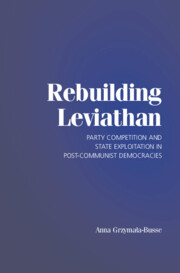Book contents
- Frontmatter
- Contents
- Acknowledgments
- List of Political Party Abbreviations and Acronyms
- 1 INTRODUCTION
- 2 COMPETING FOR THE STATE
- 3 DEVELOPING THE FORMAL INSTITUTIONS OF THE STATE
- 4 THE EXPANSION OF STATE ADMINISTRATION: PATRONAGE OR EXPLOITATION?
- 5 PRIVATIZING THE STATE: PARTY FUNDING STRATEGIES
- CONCLUSION
- APPENDIX A PEAK PARTY ORGANIZATIONS IN POST-COMMUNIST DEMOCRACIES, 1990–2004
- APPENDIX B DETERMINING STATE ADMINISTRATION EMPLOYMENT AND RATE OF GROWTH
- APPENDIX C ANCHORING VIGNETTES
- Bibliography
- Index
- Cambridge Studies in Comparative Politics
1 - INTRODUCTION
Published online by Cambridge University Press: 05 June 2012
- Frontmatter
- Contents
- Acknowledgments
- List of Political Party Abbreviations and Acronyms
- 1 INTRODUCTION
- 2 COMPETING FOR THE STATE
- 3 DEVELOPING THE FORMAL INSTITUTIONS OF THE STATE
- 4 THE EXPANSION OF STATE ADMINISTRATION: PATRONAGE OR EXPLOITATION?
- 5 PRIVATIZING THE STATE: PARTY FUNDING STRATEGIES
- CONCLUSION
- APPENDIX A PEAK PARTY ORGANIZATIONS IN POST-COMMUNIST DEMOCRACIES, 1990–2004
- APPENDIX B DETERMINING STATE ADMINISTRATION EMPLOYMENT AND RATE OF GROWTH
- APPENDIX C ANCHORING VIGNETTES
- Bibliography
- Index
- Cambridge Studies in Comparative Politics
Summary
All happy families are alike; each unhappy family is unhappy in its own way.
Leo Tolstoy, Anna KareninaWhy can some political parties freely reap private gains from the state while others constrain such extraction? The proliferation of sovereign states after the communist collapse in Eastern Europe and the Soviet Union in 1989–91 provides surprising answers that recast the relationship among political parties, party competition, and the state. It demonstrates that the degree to which governing parties can obtain private benefits from public state assets is constrained by robust competition: opposition parties that offer a clear, plausible, and critical governing alternative that threatens the governing coalition with replacement. This prospect induces anxious governments to moderate their behavior, create formal state institutions, and share power – in short, to construct safeguards against the extraction of state resources. Opposition can thus limit discretion – and inadvertently build the state.
Such competition is critical in new democracies, as the development of post-communist states shows. As democratic governing parties established the institutions of market and democracy after the communist collapse, they also opportunistically reconstructed the state: the set of formal institutions that implement policy and enforce legal sanctions. Democratic parties that earlier sought to eliminate authoritarian abuses of the state were all too happy to benefit themselves subsequently while rebuilding state institutions, and to build in continued access to state resources.
- Type
- Chapter
- Information
- Rebuilding LeviathanParty Competition and State Exploitation in Post-Communist Democracies, pp. 1 - 28Publisher: Cambridge University PressPrint publication year: 2007

